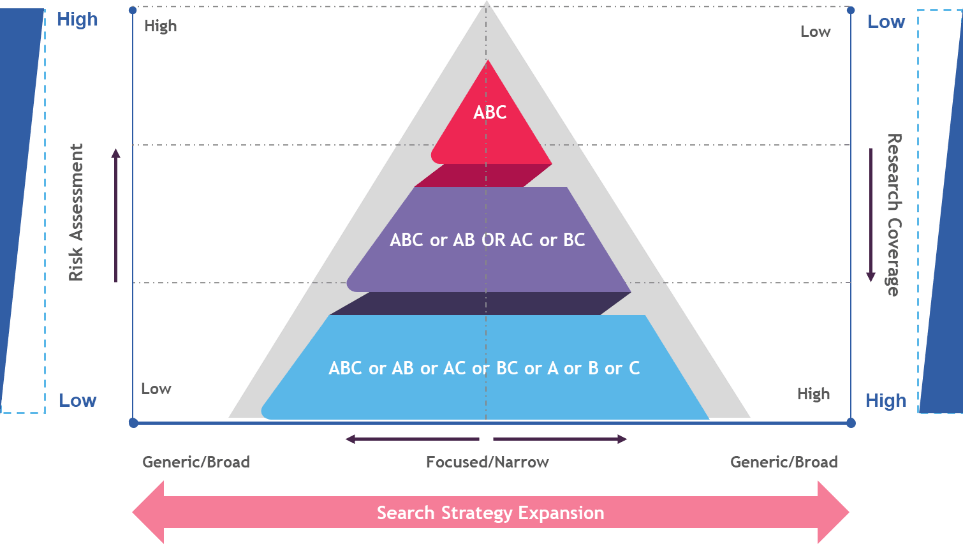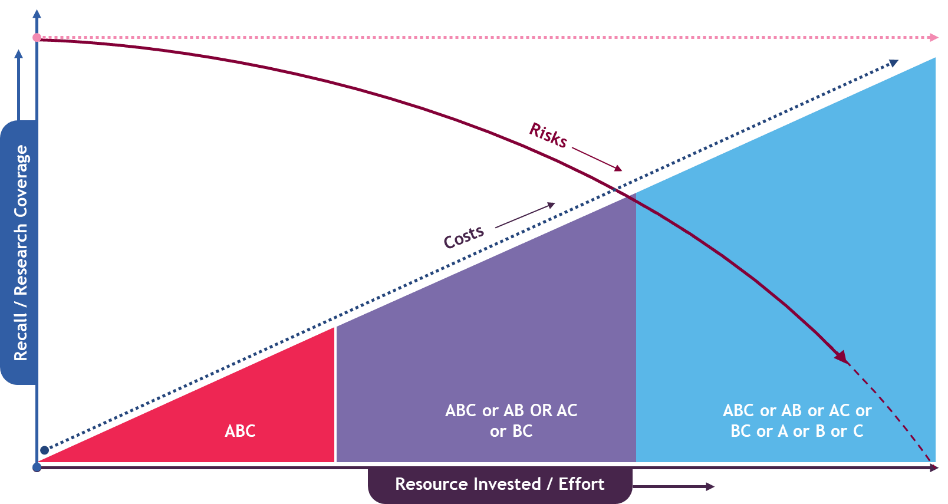In my last post, I had explained how an experienced searcher blends the right skills, tools, and techniques to avoid potential Freedom to Operate (FTO) search pitfalls. I also discussed the key parameters that need to be considered to ensure an effective FTO search.
Searchers must also consider how to balance ‘Risk versus Research’ to optimize time effectively to yield the desired results. We all work under many constraints – timelines, budget, databases, skills, etc. – so this balancing act is critical.
What is the Searcher’s dilemma?
These are the five most important questions a searcher must consider:
- Is my search strategy broad enough to be comprehensive?
- Is the scope too wide (i.e. time consuming) or too narrow (i.e. could be risky?)
- How should I prioritize my time between focusing on search strategy or focusing on analysis of search results?
- When should I end my research (considering budget constraints?)
- Does my search reduce infringement risks, or does it imply that we have eliminated the risk of infringing another party’s intellectual property?
These questions are the key pillars to define an FTO search strategy. For an IP search firm, the challenges can be more acute as they may have limited understanding of the product capabilities and the R&D stage.
What is the R&R framework and how does it help a searcher define FTO search categories?
When a research project is initiated at any company, the R&D team would normally have detailed discussions to find answers to the following questions:
- Is the project that we wish to take up ‘scientifically feasible’ considering our resources, talent, timelines, etc.?
- Do we have accurate estimations of R&D costs? What are the implications of success and failure of the project on the company’s financial status?
- Will the proposed R&D project have a significant impact on the company’s position in the marketplace (i.e. strengthen the competitive position with respect to competition; increase barriers to entry for competition, etc.).
- Have we considered the legal risks involved before we undertake this R&D project? Is there a potential infringement risk?
If these questions are considered carefully, not all FTO analysis need to be exhaustive and incur huge effort and costs.
An FTO study conducted during the early stages of the R&D process (i.e. conceptualization stage) is targeted towards a ‘patent intelligence’. This is known as a preliminary FTO analysis which helps in assessing the overall patent landscape rather than evaluating and determining the risks. The potential outcome of a patent intelligence study can be used in defining the R&D roadmap and establishing a stronger patent/product portfolio. This also helps in monitoring the competition, anticipate threats, opportunities, and design strategies to minimize risks and exposure to litigation.
However, as we progress along the product value chain, the specifics around the FTO study are increasingly stringent and critical. As a result, the FTO study becomes an expensive proposition at this point. This involves risk management activities with legal actions.
The searcher responsibility here is to decide to either conduct a ‘basic assessment’, ‘expanded assessment’; or a ‘comprehensive assessment’ to understand the patent landscape as well as safeguard the company from potential legal issues.
‘Risk and Research (R&R) Framework’ helps strike a balance between research coverage (which defines recall) and the associated risks. By referring to this framework, a searcher can easily define the various levels of their FTO search. Each of these levels predict the potential outcome of the FTO study.
The above framework defines how the ‘Research Coverage’ is linked to ‘Risk Assessment’. A searcher must decide on a strategy (search query progression) which ranges from analysis of the ‘core feature’ to a wider analysis of ‘core + non-core features’.
How can organizations develop a progressive search strategy?
As we scope the search, the first step is to compartmentalize the product/process/technology into discrete and searchable features by answering the following questions:
- What is the product/process/technology (i.e. structure)?
- What is the function?
The progressive search strategy aims to address the subject matter of a search in a structured manner. At every phase, the searcher extends the research coverage with additional modules and limits the risks as we move to different levels.
- Level 1 (basic assessment): This level begins with a combination search for all the core and non-core features. This is a tight search with low research coverage and high risk.
- Level 2 (expanded assessment): The next level requires a combination search for core features along with individual searches for core features. This is a slightly extended module with medium research coverage and medium risk.
- Level 3 (comprehensive assessment): The comprehensive search includes all possible ways to expand the core features (generic/broad) combined with the non-core features. When this module is completed, a searcher can achieve highest recall and therefore lower associated risks.
Another benefit of a progressive search strategy is the potential for alternate structural and functional solutions. This allows organizations to design around the patented features and defines the next steps. As a result, the recommendation is to use the progressive search strategy in more than one direction, such as application areas, benefits, industry, etc. This will also help identify central and peripheral references in an FTO search.
Conclusion:
Most people generally believe that an FTO search can protect them from infringement. This is not completely true, as an FTO search can provide insights on the possibility of future infringement based on the analysis of claim scope and claim interpretation. An experienced researcher can design a search strategy (using the 3C framework) and use the Risk & Research framework to optimize the available resources for optimum research coverage and analysis. This can therefore minimize potential infringement risks.
Are you interested in learning more about FTO searches? Drop us a message and we will help.




